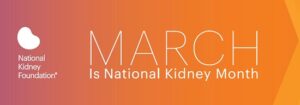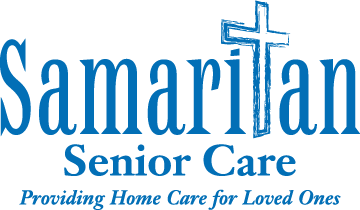National Kidney Month
National Kidney Month!

The National Kidney Foundation sponsors National Kidney Month in March to promote kidney disease awareness, prevention, and treatment.
The kidneys are the body’s chemical factories, filtering waste and performing vital functions that control things like red blood cell production and blood pressure. But over time, the kidneys can become damaged with little or no physical symptoms to warn you that your kidneys are in trouble.
Chronic kidney disease (CKD) is a serious condition affecting 37 million people. Often overlooked until symptoms appear, CKD is progressive and can put you at risk for serious health complications including kidney failure. Adopting a healthy lifestyle can help you manage and slow progression of CKD and its complications.
Follow These Healthy Lifestyle Tips to Take Charge of Your Kidney Health
- Meet regularly with your health care team. Staying connected with your doctor, whether in-person or using telehealth via phone or computer, can help you maintain your kidney health.
- Manage blood pressure and monitor blood glucose levels. Work with your health care team to develop a plan to meet your blood pressure goals and check your blood glucose level regularly if you have diabetes.
- Take medicine as prescribed and avoid NSAIDs like ibuprofen and naproxen. Your pharmacist and doctor need to know about all the medicines you take.
- Aim for a healthy weight. Create a healthy meal plan and consider working with your doctor to develop a weight-loss plan that works for you.
- Reduce stress and make physical activity part of your routine. Consider healthy stress-reducing activities and get at least 30 minutes or more of physical activity each day.
- Make time for sleep. Aim for 7 to 8 hours of sleep per night.
- Quit smoking. If you smoke, take steps to quit.
People with CKD are more likely to have heart disease and stroke — and to die early. Managing risk factors like diabetes and high blood pressure can help prevent or delay CKD. Strategies to make sure more people with CKD are diagnosed early can help people get the treatment they need.
The Foundation is Calling on All Americans to take 5 Healthy Steps for Your Kidneys this Month
1. Get Tested! Ask your doctor for an ACR urine test or a GFR blood test annually if you have diabetes, high blood pressure, are over age 60, or have a family history of kidney failure. Get screened for free through the National Kidney Foundation’s KEEP Healthy program by visiting www.kidney.org.
2. Reduce NSAIDs. Over the counter pain medicines, such as NSAIDs (nonsteroidal anti-inflammatory drugs), may alleviate your aches and pains, but they can harm the kidneys, especially if you already have kidney disease. Reduce your regular use of NSAIDs and never go over the recommended dosage.
3. Cut the Processed Foods. Processed foods can be significant sources of sodium, nitrates and phosphates, and have been linked to cancer, heart disease and kidney disease. Try adopting the DASH diet to guide your healthy eating habits.
4. Exercise Regularly. Your kidneys like it when you exercise. Regular exercise will keep your bones, muscles, blood vessels, heart and kidneys healthy. Getting active for at least 30 minutes a day can also help you control blood pressure and lower blood sugar, which is vital to kidney health.
5. Stay Well Hydrated. Staying well hydrated helps your kidneys clear sodium, urea and toxins from the body. Drinking plenty of water, and avoiding sugary beverages, is also one of the best ways to avoid painful kidney stones. Those with kidney problems or kidney failure may need to restrict their fluid intake, but for most people, drinking 1.5 to 2 liters (3 to 4 pints) of water per day is a healthy target.
It may seem difficult, but small changes can go a long way to keeping your kidneys and you healthier for longer.
